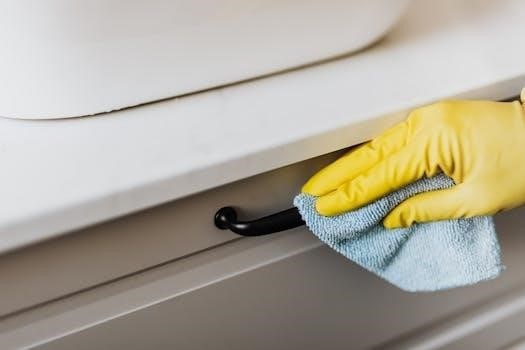how to start a foreclosure cleaning business pdf

Understanding the Foreclosure Cleaning Business
A foreclosure cleaning business specializes in restoring properties after they’ve been foreclosed upon, often by banks. This involves removing debris, cleaning thoroughly, and preparing the space for resale or reoccupation. It’s a vital service within the real estate industry.
What is a Foreclosure Cleaning Business?
A foreclosure cleaning business, also known as an REO (Real Estate Owned) cleaning business, focuses on the specialized task of cleaning and maintaining properties that have been taken over by banks or lending institutions due to foreclosure. These properties often require significant attention to detail, as they are frequently left in disarray, sometimes with abandoned possessions and varying levels of neglect. The primary goal of this type of business is to restore these properties to a clean, habitable, and marketable condition, making them ready for potential buyers or tenants. This involves more than just basic cleaning; it may include removing large items, addressing biohazards, and conducting deep cleaning to ensure the property is presentable and safe. This niche market requires a dedicated approach, understanding the unique demands of the foreclosure process and the specific needs of the clients, typically banks, real estate agents, and asset management companies. Furthermore, the business often operates on strict deadlines and requires flexibility.

Initial Steps to Starting a Business
Starting a foreclosure cleaning business requires careful planning. This includes creating a solid business plan, choosing the right legal structure, and understanding initial startup costs to ensure a strong foundation for success.
Creating a Solid Business Plan
A comprehensive business plan is the cornerstone of your foreclosure cleaning venture. This document should clearly outline your business goals, strategies, and how you intend to achieve them. Begin by defining your target market within the foreclosure sector, and identify your ideal clients, whether they are banks, real estate agents, or property management companies. Your plan must include a detailed financial forecast, estimating startup costs, operational expenses, and projected revenue streams over the first few years. It should cover your pricing strategy, taking into account factors like property size, cleaning scope, and competition. Additionally, detail your marketing approach, outlining how you will reach potential customers and build your brand. This plan should also address how you will manage cash flow and scale your business as you grow, ensuring a sustainable and profitable operation. Remember, a well-structured business plan is a dynamic guide that you should revisit and adjust regularly.
Legal Entity and Registration
Choosing the right legal structure for your foreclosure cleaning business is crucial for liability protection and tax purposes. Common options include sole proprietorship, partnership, limited liability company (LLC), or corporation. Each has different implications for personal liability, taxation, and paperwork. Consult with a legal professional or business advisor to determine the best fit for your situation. Once you’ve decided on the legal structure, register your business with the appropriate local and state authorities. This process typically involves obtaining a business license, registering your business name, and acquiring an Employer Identification Number (EIN) from the IRS if you plan to hire employees or operate as a corporation or partnership. You may also need to secure specific permits depending on your location and the services you offer. Ensure your business complies with all local and state regulations to avoid legal issues. Research all necessary requirements and fulfill them completely before beginning operations.
Essential Startup Costs
Starting a foreclosure cleaning business requires an initial investment that can vary depending on your location and scale of operations. Key startup costs include cleaning equipment, such as vacuums, mops, buckets, and specialized cleaning tools for different surfaces. You’ll also need a stock of cleaning supplies, including disinfectants, all-purpose cleaners, and bathroom cleaners. Consider the cost of a reliable vehicle for transporting equipment and supplies to job sites. Safety equipment, like gloves, goggles, and ear protection, is also necessary for your team. Initial marketing expenses, such as website development, business cards, and advertising materials, are essential for attracting your first clients. Don’t forget about costs associated with forming your legal entity, obtaining necessary licenses and permits, and securing business insurance. Some initial funds should be allocated for unforeseen expenditures to ensure you have a financial cushion to sustain your business during the initial stages. Planning for these costs will help set a realistic budget for your business.

Market and Operations
Understanding the market is crucial, involving analysis of trends and competition, finding initial clients through various methods, and having the right equipment and supplies readily available to efficiently perform the needed cleaning services.
Market Analysis and Trends
Conducting thorough market research is essential for launching a successful foreclosure cleaning business. This involves identifying the current industry trends and understanding the dynamics of the foreclosure market. It’s important to gauge the local demand for these specialized cleaning services. Analyzing both direct and indirect competitors will help you position your business effectively. Pay close attention to the volume of foreclosures in your target area. Also, evaluate the specific needs of potential clients, such as banks, real estate agents, and property management companies. This tailored approach will ensure that your services are well aligned with the market demands. Recognizing seasonal trends and economic shifts can also help you predict workflow and allocate resources accordingly. Monitoring market insights will enable you to make informed decisions and gain a competitive edge. Keeping up with the ever-changing real estate landscape is crucial for your long term sustainability and success.
Finding Your First Clients
Securing your initial clients is crucial for establishing your foreclosure cleaning business. Start by networking with real estate agents, as they often handle foreclosed properties and require cleaning services; Contact local banks and lending institutions directly, as they are key players in the foreclosure process and frequently need contractors. Explore online platforms and databases that list foreclosed properties; reach out to those responsible for maintaining them. Consider joining relevant industry associations to connect with potential clients and partners. Offering introductory rates or special promotions can attract early customers. Develop a professional website or online presence to showcase your services. Don’t underestimate the power of word-of-mouth referrals; satisfied clients can bring in more business. Attend local real estate events and property auctions to make valuable connections. Be prepared to bid competitively and demonstrate your expertise to win contracts. Remember, building trust and a reputation for quality work is essential for long-term client relationships. Consistently follow up with potential clients and maintain clear communication for success.
Equipment and Supplies
Having the right equipment and supplies is vital for efficient and effective foreclosure cleaning. Essential items include a reliable vacuum cleaner, both wet and dry options are beneficial, along with a steam cleaner for deep sanitation. Stock up on various cleaning solutions, such as all-purpose cleaners, disinfectants, bathroom cleaners, and floor cleaners. You’ll need mops, buckets, and a variety of brushes and sponges. Don’t forget safety gear, including gloves, goggles, and masks to protect yourself from potential hazards. Consider investing in a pressure washer for exterior cleaning tasks. A sturdy trash container and trash bags are essential for waste removal. Keep a first-aid kit handy for minor injuries. For larger jobs, a truck or van to transport equipment and supplies is necessary. A dolly or hand truck will aid in moving heavy items. Maintain a detailed inventory list to track your supplies and ensure you’re always prepared. Consider a storage solution for your equipment to keep everything organized. Regularly check and replace your supplies to maintain consistent quality.

Business Growth and Management
Focus on financial planning, effective marketing, and building a strong supplier network to sustain and grow your foreclosure cleaning business. Adapt to market trends and maintain high standards of service to ensure success and profitability.
Financial Planning and Cash Flow
Effective financial planning is crucial for the long-term success of your foreclosure cleaning business. Start by creating a detailed budget that outlines all expected expenses, such as equipment purchases, supply costs, transportation, and insurance. Projecting your revenue is equally vital; estimate potential earnings based on market rates and the number of jobs you anticipate securing. A thorough cash flow analysis will help you understand your income and expenditure patterns, allowing you to manage your finances effectively. Track all income and expenses diligently, using accounting software if possible, to gain clear insights into your profitability and financial health. Regularly monitor your financial performance, adjust your spending as needed, and build up a cash reserve to cover unexpected costs. Consider seeking professional financial advice for your business to ensure sound financial management and prepare for growth.
Marketing and Bidding Process
Effective marketing strategies are essential for attracting clients in the foreclosure cleaning industry. Begin by identifying your target audience, which typically includes banks, real estate agents, and property management companies. Develop a professional website and online presence to showcase your services and expertise. Network actively within the real estate community and consider attending industry events to connect with potential clients. When it comes to bidding for jobs, research market rates and tailor your quotes to specific property needs. Be thorough in your estimation process, including all services required, and present your bid in a clear and professional manner. Highlight your commitment to quality, reliability, and quick turnaround times. Following up on bids is crucial, and don’t be afraid to negotiate to secure contracts. Building a strong reputation through excellent service and positive client testimonials will lead to more opportunities.
Building a Reliable Supplier Network
Establishing a strong supplier network is crucial for the smooth operation of your foreclosure cleaning business. You’ll need reliable sources for various services and supplies, including cleaning products, equipment maintenance, waste disposal, and possibly even locksmiths. Start by researching and identifying potential suppliers in your area, comparing prices and services to ensure you get the best deals. Cultivate strong working relationships with your suppliers, as this can lead to better pricing and more flexible arrangements. Having backup suppliers is also beneficial in case one is unable to fulfill their obligations. Be proactive in communicating your needs and expectations to your suppliers, ensuring they understand the fast-paced nature of the foreclosure cleaning industry. Develop a system for tracking supplier performance and regularly evaluate their reliability. A strong supplier network will help you maintain operational efficiency and consistently deliver quality services to your clients.


